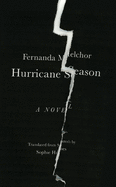
Mexican novelist Fernanda Melchor makes her unforgettable English-language debut with Hurricane Season, the snarled story of a witch murdered in the village of La Matosa. At the outset, five adventurous boys discover her water-logged corpse in an irrigation canal, sparking a series of conflicting accounts that depict the wicked events leading up to her brutal death. The accomplished Sophie Hughes translates from the Spanish, beautifully preserving Melchor's nearly uninterrupted prose, which conjures an intense gravity that can be difficult to escape.
As reviled as the Witch was, the parties she threw were raucous and lively. It's this cruel paradox that Melchor caresses time and again, as those who live in the village grapple with their dependence on, and deep disdain for, the Witch. Men needed her for sex, drugs, booze, money; women needed her to remedy the effects of those tempestuous appetites. Her vicious demise gets recounted in eight bracing chapters, whose menacing and longwinded sentences form the ferocious spiraling arms of Hurricane Season. In the eye of the storm stands Luisimi, a deadbeat who regularly consorted with the Witch. His relationship with her, and implication in her death, swirls into something like focus through vituperative reports from his closest friends and family.
Everyone's transgressions, however, are unmistakably rooted in frank depictions of poverty, need, abuse and addiction, begging empathy for those involved. In La Matosa's economy of violence, Melchor makes awfully clear the ways women bear the most unforgiving burdens of exploitation. Yet Hurricane Season weathers it all into an exquisite work of art. --Dave Wheeler, associate editor, Shelf Awareness

